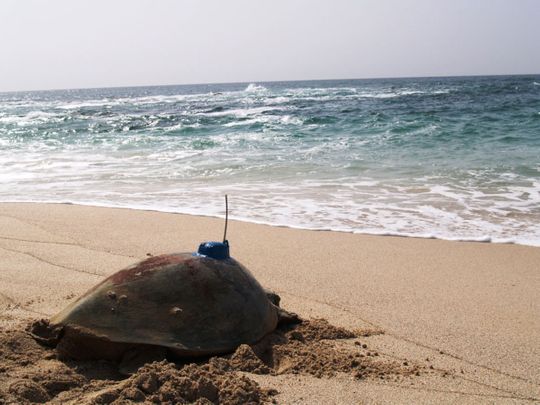
Abu Dhabi: Environment Agency — Abu Dhabi (EAD) recently launched the first-ever Abu Dhabi Red List of Wildlife Species (AD-RLS), which is an assessment of the threat status of the emirate’s terrestrial and marine species.
A total of 244 species were assessed, including 101 plants, 49 birds, nine marine species, 32 terrestrial mammals, 25 invertebrates, 26 reptiles and two amphibians. Out of the 244 species assessed, 74 are under different threat categories, such as critically endangered, endangered and vulnerable.
Dr Shaikha Salem Al Dhaheri, the EAD secretary-general, said: “The Abu Dhabi Red List is a welcome addition to our knowledge on the threat status of species found in Abu Dhabi. The list is based on the internationally recognised Red List Criteria, developed by the International Union for Conservation of Nature (IUCN) and the assessments of threat status have gone through extensive external review from a team of experts from the IUCN, the Red List Authority, and independent experts.
‘Conserving endangered species’
“Abu Dhabi has a rich diversity of species and has some of the most important species. Their populations are effectively protected by EAD through managing the largest network in the region of protected areas to conserve endangered species and their natural habitats. However, understanding the risk and evaluating the threats faced by them as well as other species, will help us better protect them,” Al Dhaheri said.
Ahmed Al Hashmi, acting executive director, Terrestrial and Marine Biodiversity Sector, said: “The Abu Dhabi Red List of Wildlife Species has been long overdue and it is an important addition to our understanding of the threats to the species in line with the global standards of IUCN. The Abu Dhabi Red List also complements the National Red List development undertaken by the Ministry of Climate Change and Environment and is consistent with the development of such lists at local, national and regional levels.”
‘An important first step’
Dr Salim Javed, acting director, Terrestrial Biodiversity and Manager of the Red List Project at EAD, observed: “The Abu Dhabi Red List is the outcome of the evaluation of extinction risk of more than 244 species, based on quantitative criteria. It is an important first step towards understanding the conservation status of Abu Dhabi’s biodiversity.”
“With 30 per cent of the total assessed species classified as threatened, the Abu Dhabi Red List will help the agency to prioritise conservation actions for some of the most threatened species in the emirate, which may include developing more systematic monitoring as well specie-specific conservation action plans in order to protect them,” Dr Javed added.
Reintroducing species
EAD has undertaken some of the most ambitious and successful projects to reintroduce species that were on the brink of extinction, such as the Arabian Oryx and Scimitar-horned Oryx. Abu Dhabi now houses the largest herd of Arabian Oryx in the world. The Shaikh Zayed Network of 13 terrestrial and six marine protected areas, managed by EAD, provides protection to some of the most threatened and important terrestrial and marine species and their habitats.
Furthermore, EAD has a plant nursery with a production capacity of nearly 500,000 plants annually and has more than 70 different native plant species propagated to date. These plant species include many rare and threatened species and are used for habitat restoration efforts across the Emirate. The Agency has successfully rehabilitated important plant species such as the Al Sarh, Ghaf and Samar trees in their natural habitat to ensure that they continue to remain part of the emirate’s landscape and its cultural heritage.





